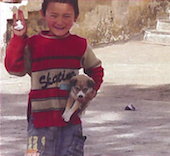FAQs
What is the Tibetan Resettlement Project Ottawa (TRPO)?
TRPO is one of several organizations across Canada to welcome and resettle 1,000 Tibetans currently living as stateless persons in the northeast Indian state of Arunachal Pradesh. The project is the result of a request by the Dalai Lama to the Canadian government. It is being implemented between 2013 and 2016.
The local resettlement organizations across Canada are overseen by the national Project Tibet Society.
TRPO, the operational arm of the project in the Ottawa region, has partnered with the Catholic Centre for Immigrants, a long-established provider of services to immigrants and refugees coming to Ottawa. The Centre's Foundation is collecting financial donations to the Ottawa project and providing tax receipts.
TRPO is managed by a volunteer Board, including several members of the small Tibetan-Canadian community in Ottawa. It is responsible for all the resettlement needs for one year for each of the 90 Tibetans who are expected to arrive in Ottawa during the three-year project.
What is Project Tibet Society (PTS)?
PTS was established as a federal not-for-profit corporation in order to design and coordinate the implementation of the Tibetan resettlement project across Canada. PTS entered into a Memorandum of Understanding with Citizenship and Immigration Canada on June 9, 2011.
What is the Canadian government contributing?
The Canadian government has agreed to grant permanent resident status to the arriving Tibetans. Citizenship and Immigration Canada (CIC) is making loans available to cover air travel and immigration landing fees. Immigration application fees have been waived altogether. In addition, CIC supports the operations of immigrant service providers like the Catholic Centre for Immigrants. However, the Canadian government is not providing any resettlement funding as such.
What costs are the Tibetan newcomers responsible for?
In addition to the air travel and landing fees mentioned above, Tibetans are responsible for travel costs within India and immigration medical examination fees. For an individual, this would come to about $2,290 of which $1,890 can be paid from a CIC loan.
Is the government of Tibet in exile (the Central Tibetan Administration) involved in this project?
Yes, there is close collaboration between the Central Tibetan Administration's Home Department and Project Tibet Society. These two organizations entered into a Memorandum of Understanding on December 12, 2011. The Central Tibetan Administration was directly involved in the lottery process which was used to identify potential applications for resettlement in Canada.
Where are the Tibetans coming from?
The Tibetans are coming from five areas in Arunachal Pradesh, a remote rural region in northeastern India where living conditions for Tibetans are especially hard.
Where will the Tibetans be settled?
The Tibetans will settle in five locations in Canada where there is already a Tibetan presence: Victoria, Vancouver / Sunshine Coast, Calgary, Toronto and Ottawa. To preserve Tibetan communities as much as possible, all the Tibetans coming from a specific settlement in Arunachal Pradesh will be placed in the same Canadian location. Since Ottawa cannot absorb all those coming from a settlement in Arunachal Pradesh, the rest from that settlement will go to Toronto.
What kinds of jobs do the newcomers need?
A job is the single most important factor for a newcomer to achieve independence and get a good start in Canada. The arriving Tibetans understand they will initially have to work at entry-level jobs in order to make room in the project for the next intake. In fact, many have qualifications and experience in areas such as organic farming, office and hotel work, and software engineering that should help them to find better jobs in the years to come.
Can the newcomers speak English?
The Tibetans have varying levels of ability in understanding and speaking, but proficiency in English is one of the criteria used by Citizenship and Immigration Canada to select candidates for the project.
What can Ottawans do to help?
The people of Ottawa as well as businesses and other organizations are being asked to help with housing, jobs, money, clothing, household furnishings, food and friendship. See Here's how to contribute in Ottawa for details.
Will I get a tax receipt for my donation?
Yes. Follow the instructions in Here's how to contribute in Ottawa.
How much of my cash donation goes to the Tibetans settling in Ottawa?
All of it, apart from a small service charge for online donations through CanadaHelps.org. Those working on the project are all volunteers. The Catholic Centre for Immigrants does not charge for its services to immigrants and refugees.

